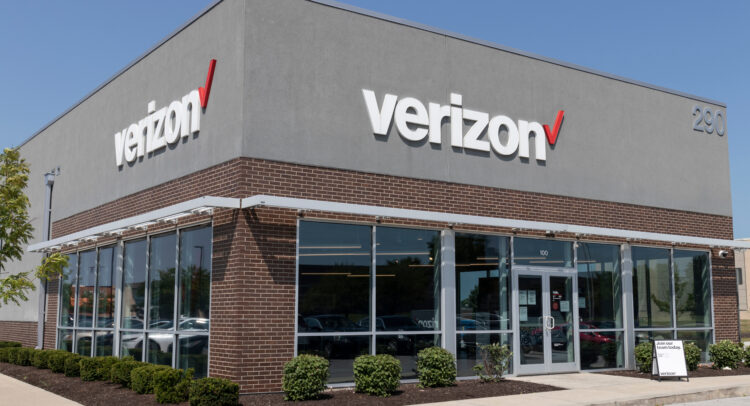Verizon stock (NYSE:VZ) is among the most famous dividend stocks. The company is praised for its resilient business model, years of consistent dividend growth, and sizable dividend yield of 6.6%. Despite concerns causing shares to hit 13-year lows last year, Verizon stock has rebounded, signaling somewhat restored confidence in the dividend. Still, risks associated with the company’s heavy debt load persist, posing challenges to the dividend. Consequently, I’m neutral on the stock.
Meet Your ETF AI Analyst
- Discover how TipRanks' ETF AI Analyst can help you make smarter investment decisions
- Explore ETFs TipRanks' users love and see what insights the ETF AI Analyst reveals about the ones you follow.

Why Were Investors Worried About Verizon’s Dividend Last Year?
Despite Verizon’s well-established standing as a reliable dividend growth stock, concerns among investors regarding the company’s dividend escalated last year. Last October, the stock fell under $30, marking its lowest point since 2010 and reflecting investors’ diminished enthusiasm for the substantial payouts that have traditionally been a hallmark of Verizon’s investment case.
The primary cause for these concerns can be traced back to rising interest rates. While rising rates typically have an adverse impact on YieldCos by elevating their cost of equity, Verizon faced additional scrutiny due to its substantial debt burden. With the company’s long-term debt standing at over $147 billion (as of its Q3 results) and the possibility of elevated rates persisting in the short-to-medium term, it’s no wonder investors feared about Verizon’s future dividend coverage.
However, with economic indicators improving in recent months and Wall Street expecting rate cuts this year, as hinted by the Fed, investor confidence in the stock appears to be gradually returning. In the meantime, the company’s Q4 results came in quite decent. Let’s take a deeper look.
Verizon’s Q4 Results – Improving Metrics Boost Investor Confidence
Verizon’s most recent Q4 results were received well by investors, with the company posting improving its metrics across the board. On Tuesday, shares opened more than 5% higher in Verizon’s post-earnings trading session.
To begin with, even though Verizon’s revenues declined by 0.6% compared to last year, the company beat Wall Street’s top-line estimate by $500 million. Additionally, Verizon succeeded substantially by adding 413,000 broadband subscribers during the quarter, marking the fifth consecutive quarter of such growth. Notably, 375,000 of these subscribers were attributed to fixed wireless access, contributing to a subscriber base exceeding three million.
Management’s announcement that the company is ahead of schedule to achieve its target of between four and five million fixed wireless subscribers by the end of 2025 further instills confidence in Verizon’s future results.
Finally, management’s guidance points toward another year of steady growth. Verizon expects to achieve total Wireless Service revenue growth of about 2% to 3.5% and adjusted EBITDA growth of 1% to 3%.
Note that adjusted EPS is expected to land between $4.50 and $4.70, implying a decline from Fiscal 2023’s $5.18. This is due to rising interest costs as a result of higher rates these days, which is going to negatively affect Verizon’s bottom line, as mentioned earlier. However, this forecast implies that the dividend, with its annual rate now standing at $2.66, remains well covered.
Is Verizon’s Dividend Safe, After All?
Verizon’s stock is rebounding from its 52-week lows, signaling increased investor confidence, which is likely bolstered by faith in the company’s dividend. But is Verizon’s dividend actually safe?
On the one hand, management’s guidance indicates ample coverage from adjusted EPS. From this point of view, the payout ratio stands at a healthy ~58%.
On the other hand, Verizon’s debt load remains humongous, and its CapEx needs to remain elevated. The company expects CapEx to be between $17.0 billion and $17.5 billion next year, which is about half its operating annual operating cash flows. Now, consider the annual dividend payments of about $11 billion, and it’s easy to see that there are only a few billion dollars of free cash flow left for the company to pay down debt. Thus, leverage is set to remain high, which is always going to be a threat to the dividend.
In a scenario of high interest rates lasting for several quarters, the company might be compelled to continually issue additional debt to meet both dividend obligations and CapEx needs—an unsustainable cycle. It appears that the market expects that we won’t reach this stage, as interest rates are likely to start falling before the company needs to refinance some of its heavy debt load. Still, you should keep both scenarios in mind when considering if Verizon’s 6.6% yield is worth buying into.
Is VZ Stock a Buy, According to Analysts?
Turning to Wall Street, Verizon Communications has a Moderate Buy consensus rating based on 10 Buys, six Holds, and one Sell assigned in the past three months. At $44.18, the average VZ stock price target implies 6.3% upside potential.
If you’re wondering which analyst you should follow if you want to buy and sell VZ stock, the most accurate analyst covering the stock (on a one-year timeframe) is Michael Rollins from Citi, with an average return of 12.63% per rating and an 89% success rate.

The Takeaway
Verizon’s recent Q4 results and stock rebound indicate resilience and restored investor confidence. While concerns about rising interest rates affecting the dividend persist, the company’s performance remains solid.
However, caution is advised due to a substantial debt load and ongoing capital expenditures. Although management’s guidance suggests dividend coverage, the potential impact of sustained high interest rates on Verizon’s financials warrants careful consideration. Thus, I believe investors should weigh these factors when assessing the allure of Verizon’s 6.6% yield.
















